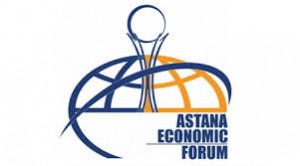 ASTANA – President Nursultan Nazarbayev of Kazakhstan delivered the keynote address to the international seventh Astana Economic Forum on May 23.
ASTANA – President Nursultan Nazarbayev of Kazakhstan delivered the keynote address to the international seventh Astana Economic Forum on May 23.
In his address to more than 3,000 international and domestic participants, President Nazarbayev urged all nations to build their relations on the fundamental principles of trust and openness. He also expressed deep concern for the outcome of the current global dialogue.
“In the 21st century, all countries, all politicians need to learn to live in a world of G-GLOBAL, on its principles of evolutionism, trust, openness, tolerance and dialogue. Globalisation certainly has made the world much closer, more transparent and more accessible to everyone. However, at the moment, the world, which has barely survived after the global financial and economic crisis, could again plunge into a state of recession and slowdown. Balancing the system of international relations on the blade end of global dialogue is a dangerous trend,” President Nazarbayev said.
He also emphasised the importance of de-politicising economic relations and avoiding artificial fostered conflicts between countries and regions as well as of not using the rhetoric of conflict.
“Kazakhstan has always followed the ‘economy first’ principle. Thanks to this, we are actively developing. Kazakhstan entered the top five of the fastest developing countries in the past decade and a half. We have adopted the Kazakhstan 2050 Strategy and are implementing ambitious tasks on comprehensive modernisation. We aim to be among the 30-most-developed countries in the world, and we intend to achieve these goals in close integration with our neighbours,” Nazarbayev stated.
Taking into account the fact that almost 1.5 billion people live on less than one dollar a day and nearly 2.5 billion people, about 40 percent of the world’s population, earn less than two dollars a day, President Nazarbayev encouraged concentrating on the main tasks of reducing inequalities and eradicating poverty in the world.
“In my view, to solve these problems, we should move in the following two directions. First, we need to make the most of potential economic development and avoid new significant economic shocks. Second, it is necessary to develop a ‘Road Map for Poverty Eradication,’ which would include extensive tools for the development of human capital in the poorest countries of Asia and Africa,” the Kazakh leader proposed.
On the sidelines of the forum and the second World Anti-Crisis Conference, which was an important part of the event, President Nazarbayev met with Nobel prize laureates, including Kurt Wüthrich, Finn Kydland, George Fitzgerald Smoot III, Muhammad Yunus, Svyatoslav Timashev, Christopher Pissarides and Arie Varšel.
Nazarbayev expressed his gratitude for their contribution to the work of the 7th Astana Economic Forum and stressed that the formation of the Astana Club of Nobel Laureates gives particular significance to the event.
“Your participation in the forum is making a real contribution to the constructive solution of the world’s economic problems, which are many as of today. Your presentations at sessions, active participation in the formulation of proposals and outcomes of the forum are of great importance,” the President added.
During the forum, they discussed a number of issues relating to global economic, social and political development as well as issues of Kazakhstan’s development in the context of globalisation.
Nazarbayev said the consequences of the global financial and economic crisis continue to have a strong impact on the global economy resulting in uncertainty in solving the economic problems in Europe and slower growth in developing countries.
The head of state described measures taken by Kazakhstan in view of today’s global challenges. He mentioned the Kazakhstan 2050 Strategy and the programme of Accelerated Industrial and Innovative Development.
President Nazarbayev also said Kazakhstan is making a significant contribution to the development of world energy, including alternative sources of energy. He also said the international specialised exhibition EXPO 2017 and its theme of “Future Energy” would further promote the development of alternative energy sources.
In their turn, the Nobel laureates noted Kazakhstan’s contribution in the development of science and innovation as well as stressed that the Astana Economic Forum has become a global platform for discussing international social and economic problems.
The three-day Astana Economic Forum completed its work on May 23. It took place under the theme of “Risk management in the era of challenges in the Format of G-Global.” One of the top economic gatherings in the world, this year it brought together 10,000 participants from 150 countries, while the second World Anti-Crisis Conference took place at the forum with the support of the United Nations.
